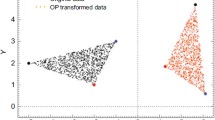Abstract
Independent Component Analysis (ICA) has shown success in blind source separation. Its applications to remotely sensed images have been investigated recently. In this approach, a Linear Spectral Mixture (LSM) model is used to characterize spectral data. This model and the associated linear unmixing algorithms are based on the assumption that the spectrum for a given pixel in an image is a linear combination of the end-member spectra. The assumption that the abundances are mutually statistically independent random sources requires the separating matrix to be unitary. This paper considers a new approach, the Non Orthogonal Component Analysis (NOCA), which enables to relax this assumption. The experimental results demonstrate that the proposed NOCA provides a more effective technique for anomaly detection in hyperspectral imagery than the ICA approach. In particular, we highlight the fact that the difference between the performances of the two approaches increases when the number of bands decreases.
Preview
Unable to display preview. Download preview PDF.
Similar content being viewed by others
References
Adams, J., Smith, M., Gillespie, A.: Image spectroscopy: Interpretation based on spectral mixture analysis. In: Pieters, C., Englert, P. (eds.) Remote Geocheminal Analysis: Elemental and Mineralogical Composition, pp. 145–166. Cambridge Univ. Press, Cambridge (1993)
Smith, M., Adams, J., Sabol, D.: Spectral mixture analysis - new strategies for the analysis of multispectral data. In: Hill, J., Mergier, J. (eds.) Image Spectroscopy - A Tool for Environmental Observations, pp. 125–143. ECSC, EEC, EAEC, Brussels and Luxembourg, Belgium (1994)
Manolakis, D., Shaw, G.: Detection algorithms for hyperspectral imaging applications. IEEE Signal Proc. Mag., 29–43 (January 2002)
Amari, S.-I., Cichocki, A.: In: Adaptive Blind Signal and Image Processing. J. Wiley and Sons (eds.). Wiley, New York (2002)
Comon, P.: Independent component analysis, a new concept? IEEE Trans. Signal Processing 36, 287–314 (1994)
Hyvärinen, A., Oja, E.: A fast fixed-point algorithm for independent component analysis. Neural Comput. 9, 1483–1492 (1997)
Hyvärinen, A.: Fast and robust fixed-point algorithms for independent sources: A deflation approach. Signal Process. 45, 59–83 (1995)
Chang, C.-I., Heinz, D.: Subpixel spectral detection for remotely sensed images. IEEE Trans. Geosci. Remote Sensing 38, 1144–1159 (2000)
Ren, H., Chang, C.-I.: A generalized othogonal subspace projection approach to unsupervised multispectral image classification. IEEE Trans. Geosci. Remote Sensing 38, 2515–2528 (2000)
Cover, T., Thomas, J.: Elements of information theory. Wiley, New York (1991)
Robey, F.C., Fuhrmann, D.R., Kelly, E.J., Nitzberg, R.: A cfar adaptive matched filter detector. IEEE Trans. Aerosp. Electron. Syst. 28(1), 208–218 (1992)
Chang, C.-I., Chiang, S.-S., Smith, J.A., Ginsberg, I.W.: Linear spectral random mixture analysis for hyperspectral imagery. IEEE Trans. Geosci. Remote Sensing 40(2), 375–392 (2002)
Papadias, C.: Globally convergent blind source separation based on a multiuser kurtisis maximization criterion. IEEE Trans. Signal Processing 48(10), 3508–3519 (2000)
Cardoso, J.-F., Laheld, B.: Equivariant adaptive source separation. IEEE Trans. Signal Processing 44(12), 3017–3030 (1996)
Chang, C.: In: Hyperspectral Imaging, Academic, K. (ed.), Plenim (2003)
Author information
Authors and Affiliations
Editor information
Editors and Affiliations
Rights and permissions
Copyright information
© 2006 Springer-Verlag Berlin Heidelberg
About this paper
Cite this paper
Gaucel, JM., Guillaume, M., Bourennane, S. (2006). Non Orthogonal Component Analysis: Application to Anomaly Detection. In: Blanc-Talon, J., Philips, W., Popescu, D., Scheunders, P. (eds) Advanced Concepts for Intelligent Vision Systems. ACIVS 2006. Lecture Notes in Computer Science, vol 4179. Springer, Berlin, Heidelberg. https://doi.org/10.1007/11864349_109
Download citation
DOI: https://doi.org/10.1007/11864349_109
Publisher Name: Springer, Berlin, Heidelberg
Print ISBN: 978-3-540-44630-9
Online ISBN: 978-3-540-44632-3
eBook Packages: Computer ScienceComputer Science (R0)




